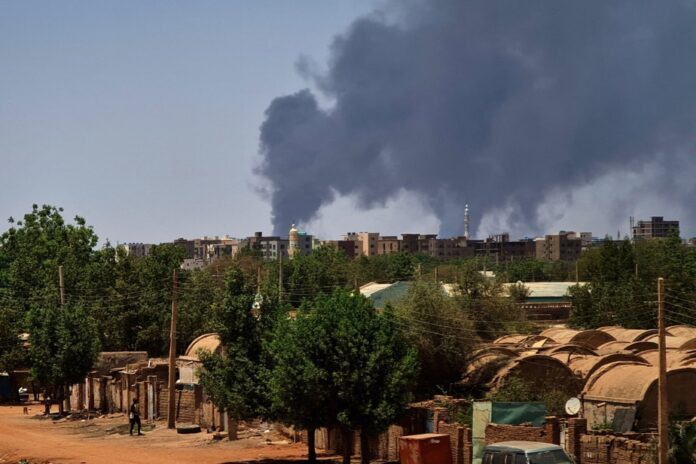(Khartoum) Fierce fighting continues Tuesday in Sudan between the army and the paramilitaries ignoring a constantly violated truce, while the UN is alarmed by the humanitarian “catastrophe” and the lack of international aid.
“We hear gunshots, military planes and anti-aircraft fire,” a Khartoum resident told AFP.
Other witnesses confirm “ aerial bombings ” in various districts of the capital, which have been plagued by chaos since the head of the army Abdel Fattah al-Burhane and his deputy, Mohamed Hamdane Daglo, at the head of the paramilitaries of the Support Forces Rapid (FSR), went to war for power on April 15.
More than 500 people died, mainly in Khartoum and Darfur (west), and thousands were injured, according to a largely underestimated report.
A new truce, violated from the start, must end on Wednesday at midnight. But it allows evacuations to continue. Russia and Pakistan announced on Tuesday that they had evacuated hundreds of their nationals.
More than 330,000 people – Sudanese and refugees from other African countries – have been displaced and 100,000 have left for neighboring countries, according to the UN, which expects eight times more refugees if the war continues.
Those who remain are enduring water, electricity and food shortages in Khartoum, one of the hottest cities in the world.
The conflict has plunged the country, one of the poorest in the world, into a “real disaster”, according to the UN, which says it has received only 14% of the funds requested this year – 1.5 billion dollars are missing. the call.
But for William Ruto, the Kenyan president and one of the regional mediators, the two generals refuse “ to hear the calls ” from the international community.
Americans, Saudis and African leaders are currently seeking to ensure that a truce is respected. On this point, the two belligerents assure “ to be ready to start technical discussions ”, said the UN envoy to Sudan, Volker Perthes, to the Al-Arabiya channel.
These discussions will not be “ not face-to-face ” and “ could be held in Saudi Arabia”, he said. It is only then that a return to political discussions will be possible, he insisted.
Already on April 15, Mr. Perthes had related in recent days, the two generals were to see each other. But they preferred to let the weapons speak.
The two men had stood together to oust the civilians with whom they shared power since the fall of dictator Omar al-Bashir in 2019, during the 2021 putsch. But then differences emerged and the conflict between the two escalated. intensified when they failed to agree on the integration of the FSR into the army, before turning into an armed struggle.
US Secretary of State Antony Blinken “reiterated US support” for diplomatic efforts to “end the conflict” and ensure “unimpeded humanitarian access”.
After Riyadh, an emissary from General Burhane met the Egyptian authorities in Cairo, where the Arab League has been discussing Sudan since Monday.
“ Without decisive intervention, the most likely scenario is that of a protean, long and bloody civil war ”, writes Ernst Jan Hogendoorn for Atlantic Council.
This expert from Sudan warns of a “staggering humanitarian catastrophe, similar to that in Somalia, Syria or Yemen”, with a risk of regional destabilization.
From Nairobi, the head of the UN for humanitarian affairs, Martin Griffiths, tries to negotiate the entry of aid while the bombings and looting have spared neither hospitals nor humanitarian organizations.
Aid is coming in a trickle, however: six containers of WHO medical supplies arrived after a Red Cross plane.
The situation is even more critical in West Darfur, bordering Chad, where violence has killed, according to the UN, a hundred people since last week, in this region traumatized by a bloody war in the 2000s.
The health system there has “ completely collapsed ”, worry doctors, while many experts warn of a contagion of violence across porous borders.


















